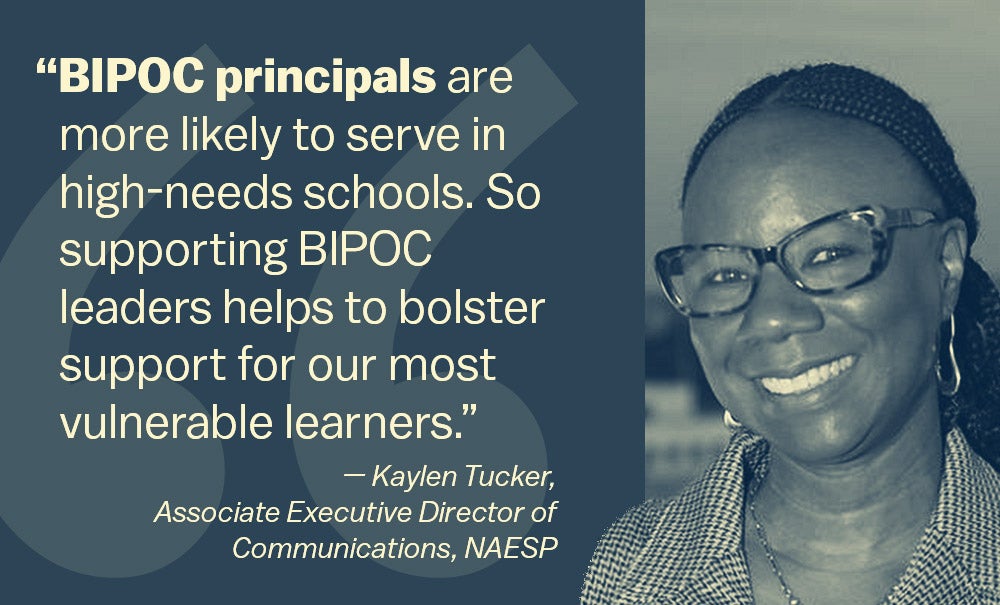Teacher burnout and shortages have been making headlines for months now as schools have struggled to adequately staff their classrooms. But what about the school leaders who are managing the constant changes and crises, and facing sometimes hostile criticism of their decision making? Turns out they’re not immune to the burnout their colleagues are reporting, and experts say the fallout could severely impact the principal pipeline for years to come.
The National Association of Secondary School Principals (NASSP) has released an alarming report based on their national survey of secondary school principals, the results of which indicate a looming exodus of principals from preK-12 schools. A staggering 4 out of 10 principals surveyed expect to leave the profession in the next three years, and the pandemic and increased political tensions are among the factors they cite for accelerating this decision.
“It’s going to shock the education system,” says Aman Dhanda, chief engagement officer at NASSP says of the findings. But she also noted that, while alarming, the results of the survey were not surprising.
Brian Cox, a principal at Johnson Middle School in Cheyenne, Wyo., agrees. “Issues have compounded from the pandemic, the political climate,” he says. “Nothing has been calm from 2019 to the present.”
Indeed, beyond managing significant changes in running their schools as the pandemic continues, some principals have also encountered hostile reactions to their mitigation efforts. More than one-third of principals surveyed said they had been threatened in response to the steps they have taken to stop the spread of COVID in their school.
“Seeing what’s happening at school board meetings, that’s wearing on our leaders,” says Nancy Antoine, principal of Bridgewater Elementary School in Northfield, Minn. Twenty-six percent of survey respondents reported receiving in-person threats from their local community members, with 20 percent reporting that these threats have made them much less likely to continue as a principal.
Besides the new challenges that have emerged in the last two years, principals surveyed reported that more commonly known factors like heavy workloads and state accountability measures are most likely to cause them to leave the profession.
The consequences of the loss of experienced principals cannot be understated. Recent research tells us that principals are even more important than previously believed. Besides their strong impact on student achievement, effective principals also have positive impacts on teacher satisfaction and retention.
The ripple effects of losing effective principals could have devastating effects on already resource-scarce schools. “When there is rapid turnover at the principal level a school can lose momentum and any gains in student achievement,” says Kaylen Tucker, associate executive director, communications at the National Association of Elementary School Principals (NAESP). Dhanda at NASSP agrees, adding that students of color and those from low-income families could stand to lose the most.
What can be done now to prepare for—or better yet, mitigate—a mass exodus of principals over the next few years?
A new report from NAESP’s Leaders We Need Now series suggests that the role of the principal has evolved significantly over the past two years, but no corresponding support has followed. This has resulted in a triage effect where principals put important responsibilities, such as equity and school improvement, on the back burner in favor of more immediately pressing tasks like COVID tracing.
“I hear from principals a lot that they are hyper-focused on keeping their school community safe—and that includes attending to [the community’s] social and emotional needs,” says Tucker.
The NAESP report points to implications of the evolving role for the principal pipeline, with the biggest impact on job standards and pre-service training. The research shows that crisis management and communications management will be important areas of expertise for principals in the future and both current and new principals will need additional training and support in these areas.
“The Leaders We Need Now research elevates why investing in principal pipelines takes on even greater urgency now,” says Tucker. “The research demonstrates that all phases of the continuum must be prioritized.”
Dhanda, too, encourages school districts to invest in the long-term health of their principal pipelines by preparing their school leaders of tomorrow and training their principals today. She points to Atlanta Public Schools as one district that is already addressing this issue by investing in salary increases and staff retention bonuses to attract and retain leaders. District leaders also plan to convene educators on the topic of mental well-being—for students and for the adults in the building too.
The NAESP report suggests that besides improving support and professional development for school leaders, redistributing some responsibilities to assistant principals, teacher-leaders and central office staff could help address the changes they’ve identified in the role.
The principals we spoke to agreed with the redistribution of responsibilities and also emphasized the importance of elevating the voices of principals early on in the decision-making process, not just after new ideas have been implemented. “Building a team or networking system that will embrace leaders and make them feel trusted, listened to and empowered can assist in addressing and taking the next steps to greater success,” says Lisa Higa, principal of Nānākuli Elementary School in Honolulu.
Many principals themselves are helping to nurture the school leaders of the future. In Minnesota, Antoine teaches graduate-level courses for future school administrators and encourages her fellow principals to identify and support educators to become school leaders, despite all of the challenges the role entails.
Higa hopes to do the same someday. “There are great leaders out there,” she says. “What message do we ignite in them to empower the field of the principalship?”



